Dec 19, 2023
Summit panel addresses intersection of organic, regenerative
Though a group of panelists agreed that organic farming practices must be the baseline for any official regenerative ag certification, one member of the panel said he does not expect that to happen.
And all the members agreed that the regenerative ag movement could have a profound impact on agriculture and on the organic sector.
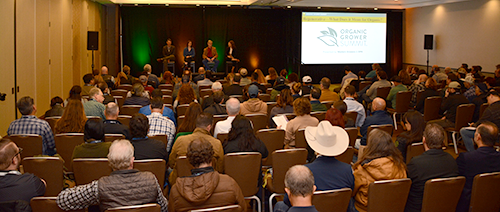
This informed panel of experts was speaking at the Organic Grower Summit, Nov. 29-30 in Monterey, California. The Organic Produce Network and Western Growers presented the event.
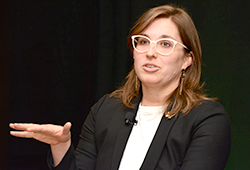
Jessy Beckett Parr, chief program officer for California Certified Organic Farmers (CCOF) led off the questioning by asking each panelist where they stood regarding the role of organic farming in a regenerative ag certification. In fact, CCOF offers certification to the Regenerative Organic Certified (ROC) standard, which requires the USDA organic certification as a prerequisite. But there are others in the movement that do not believe organic farming practices have to necessarily be followed to be labeled regenerative.
To that question, panelist and organic farmer Vernon Peterson of Abundant Harvest Organics did not pull any punches.
“They can’t be separated. It is impossible to be regenerative and not be organic,” he said.
Rebecca Gildiner, director of sustainability at Daily Harvest, agreed.
“We believe to be truly regenerative, it has to be organic,” she said.
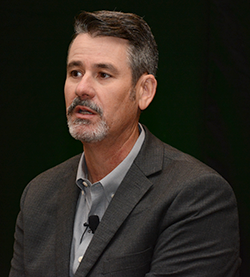
Eric Morgan, vice president of science and resources at Braga Fresh, did not disagree with the concept but sounded a cautionary note that he does not believe that philosophy will win out. The State Board of the California Department of Food and Agriculture is considering creating regenerative ag standards and certifying against it apparently without the organic component.
“We believe regenerative has to include organics,” he said of Braga Fresh. “Unfortunately, we don’t think the tide is moving in that direction. I am an organics-only guy, but it doesn’t look like it’s going in that direction.”
Morgan offered no hard evidence for his assertion but indicated that his intel is that there are a lot of influencers behind the regenerative ag movement, and it does not appear they are focused on making compliance with organic certification standards a mandatory component.
Parr noted that the regenerative ag movement appears to be the latest cause to attract the eye of the “Hollywood” crowd and its money. She worries that the unregulated regenerative ag concept will replace the regulated and certified USDA organic seal, resulting in what she called “greenwashing,” which is defined as the act of making false or misleading statements about the environmental benefits of a product or practice. The fear is that the organic seal will lose some of its stature.
She added that CCOF is doing its best to make sure that organics is the baseline of regenerative ag certification.
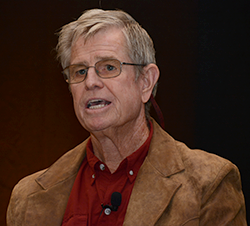
Peterson’s farm has received the ROC seal from CCOF, and he sees the regenerative ag movement as an opportunity for the industry. He called it a consumer-driven movement. Because the Regenerative Organic Alliance has already established the ROC standards, which include organic farming, he believes that organization and the state’s organic farmers should lead in the effort of defining the term “regenerative” and its standards. He said consumers want farmers to use better agricultural practices that address environmental issues such as climate change.
“Our survival depends on trying to adjust what we do to fit what the consumer wants,” he said.
Throughout the session, Peterson continued to give a full-throated endorsement to following regenerative ag practices. He noted that the certification process has to be doable but indicated it’s an excellent concept that goes beyond organic certification requirements.
While organic certification eliminates the toxins in farming, he called regenerative ag a “bottoms-up system” that has many different components, with one of the most important being treating labor fairly.
“You can’t call yourself regenerative if you are not addressing the fundamental unit of production, which is labor,” he said.
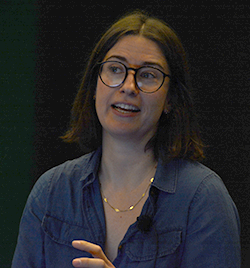
There was also some discussion about the ability to adopt regenerative ag practices for row crops as opposed to tree crops. One of the basic fundamentals of regenerative ag is to keep tilling to a minimum to enhance the sequestering of carbon. This is much more easily achieved with tree crops than row crops.
Morgan explained how Braga Fresh is experimenting with grain crops in the middle of a vegetable row to grow deep roots that produce the aeration that the vegetable crops need without deep and frequent tilling.
Morgan made several other interesting observations during the panel. He noted that Walmart is calling itself a regenerative company and wants its suppliers to get involved. Because of the buying power of that chain, which some metrics say is the largest retailer in the world, Morgan said the industry better pay attention. “If Walmart is asking for it, they are probably going to get it,” he said.
He also noted that organic growers are a step ahead of conventional growers when it comes to being prepared for certain regulatory changes.. He said regulators are eliminating some synthetic crop protection tools and soon conventional growers will have to learn to farm without these aids.
“The way a conventional grower is farming today won’t be available in 20 years,” he said, adding that they will have to combat pests in another way and use far less nitrogen.
— The Organic Produce Network






